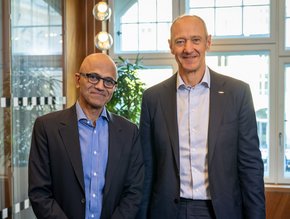Accenture: Whether COVID-19 pandemic with cloud technology

How much do you know about cloud technology?
As more people are working from home, due to the COVID-19 pandemic, Accenture has produced a new report, Cloud computing – Understanding what cloud is and what it can do for you, which offers a simple guide to help people and businesses accelerate their migration to the cloud.
“This requires speed, new thinking and an entirely different level of skills and investments to achieve end-to-end digital transformation,” says Accenture.
“We are now at a crucial point. Now, more than ever, cloud computing is vital to helping businesses and people deliver on and realise the promise of digital transformation.”
What is cloud computing?
When the internet was in its infancy the word 'cloud' was used as a metaphor to describe how the complex telephone networks connected, outlines Accenture. “Now, many people and organisations refer to it as 'THE cloud'.
“Cloud is a model of computing where servers, networks, storage, development tools and even applications (apps) are enabled through the internet. Instead of organisations having to make major investments to buy equipment, train staff and provide ongoing maintenance, some or all of these needs are handled by a cloud service provider.”
There are five key characteristics of a cloud computing environment, as defined by the National Institute of Standards and Technology (NIST):
- Internet Access
With a public cloud environment, users "plug into" the data via an internet connection - Measured Service
Cloud is often pay-as-you-go, where you only pay for what you use. - On-Demand Self-Service
Services can be requested and provisioned quickly, - Shared Resource Pooling
Cloud often uses the multi-tenancy model. - Rapid Elasticity
Cloud platforms are elastic - organisations can scale its resource usage levels up or down
Why is cloud computing important?
“Many of us use cloud services every day. When we update our status on social media, binge a new streaming series or check our bank accounts,” says Accenture. These apps are accessed through an internet connection rather than installed on our hard drives or devices.
Today, cloud technology means that companies can scale and adapt at speed and scale, accelerate innovation, drive business agility, streamline operations and reduce costs.
“Not only can this help propel companies through the current crisis, it can lead to increased, sustainable growth,” says Accenture.
According to research by Future Systems companies that are more strategic in their approach to technology are doing better financially. They are achieving more than twice the average revenue growth of companies slow to implement their tech. In fact, 95% of leaders have adopted sophisticated cloud services.
What are the types of cloud technology?
Cloud computing can be deployed using these different models:
Public cloud
This uses an internet connection to access computing resources hosted on data centres managed by a third-party cloud service provider - rather than owning it yourself
The big four hyperscalers are referred to as MAAGs, they are: Microsoft (Azure), Amazon (Amazon Web Services or AWS), Alibaba (Alicloud) and Google (Google Cloud).
Private cloud
This is implemented on servers owned and maintained by an organisation and accessed over the internet or through a private internal network.
“A private cloud environment gives you complete control over data and security to meet specific regulatory and other compliance requirements (such as HIPAA for healthcare, GDPR, GxP for Pharma), says the guide.
Hybrid cloud
Many organisations use a combination of several cloud environments. This is referred to as a hybrid cloud approach.
“Hybrid cloud eliminates reliance on any single cloud provider and allows for additional levels of flexibility in terms of capabilities, security compliance,” says Accenture.
Multi Cloud
Organisations use services from multiple public cloud providers.
Service categories include:
- Software as a Service (SaaS)
SaaS is the most common cloud application service. An organisation accesses a specific software application hosted on a remote server and managed by a third-party provider.
- Platform as a Service (PaaS)
PaaS is a popular choice for businesses who want to create unique applications without making major financial investments.
- Infrastructure as a Service (IaaS)
IaaS is the simplest option for businesses. With IaaS, an organisation migrates its hardware—renting servers and data storage in the cloud rather than purchasing and maintaining its own infrastructure.
Is the cloud secure?
A one-size-fits-all approach is not the answer to cloud security. “But with the many tools and practices now available, security shouldn't provide an obstacle to effective cloud migration and management,” comments Accenture.
Jonathan Roz, Managing Director, Accenture Cloud & Security, recommends taking these steps to become secure:
- Define new security policies and procedures
- Configure to the appropriate framework
- Identify the relevant controls needed to monitor policies and procedures
- Create a cloud-specific security reference architecture
- Move to a DevSecOps model
For more information on business topics in Europe, Middle East and Africa please take a look at the latest edition of Business Chief EMEA.
- How analogous inspiration can solve your strategic deadlockLeadership & Strategy
- Cloud is driving IT spending through the roof across EuropeTechnology
- Which European nations have the most successful companies?Corporate Finance
- Companies are realising a rapid return on AI investmentsTechnology






